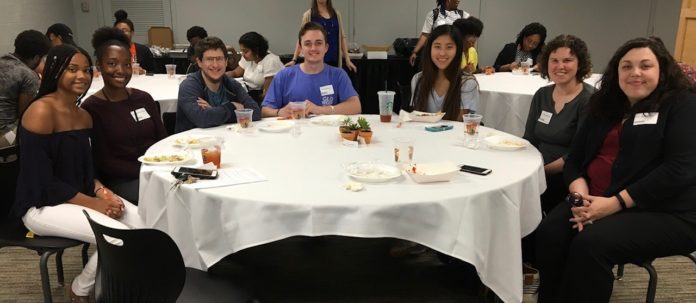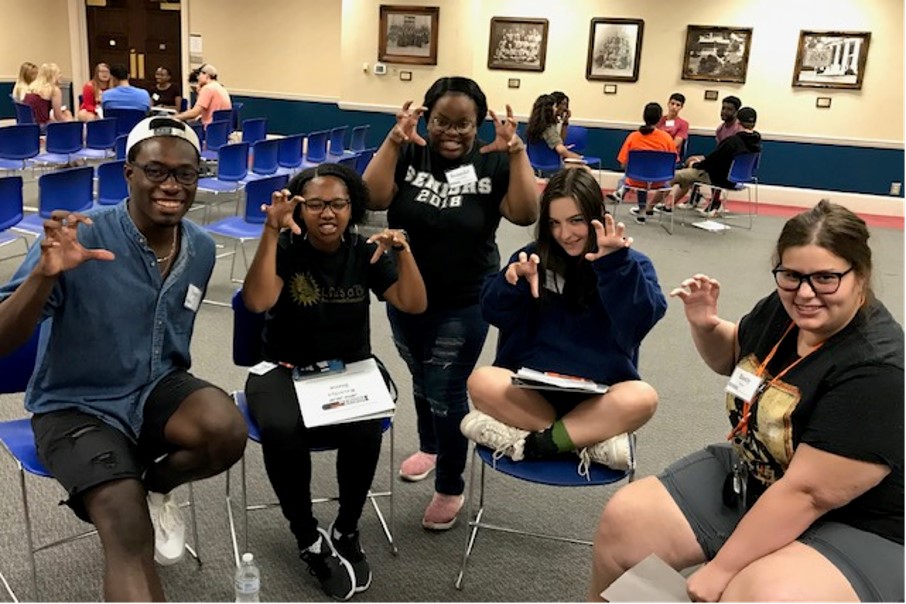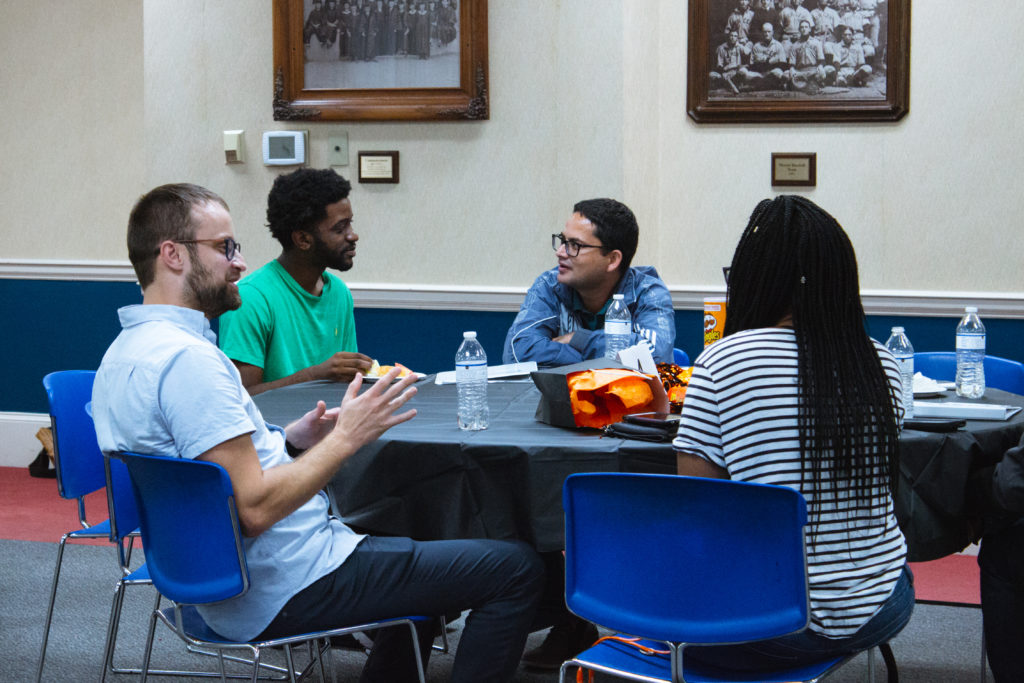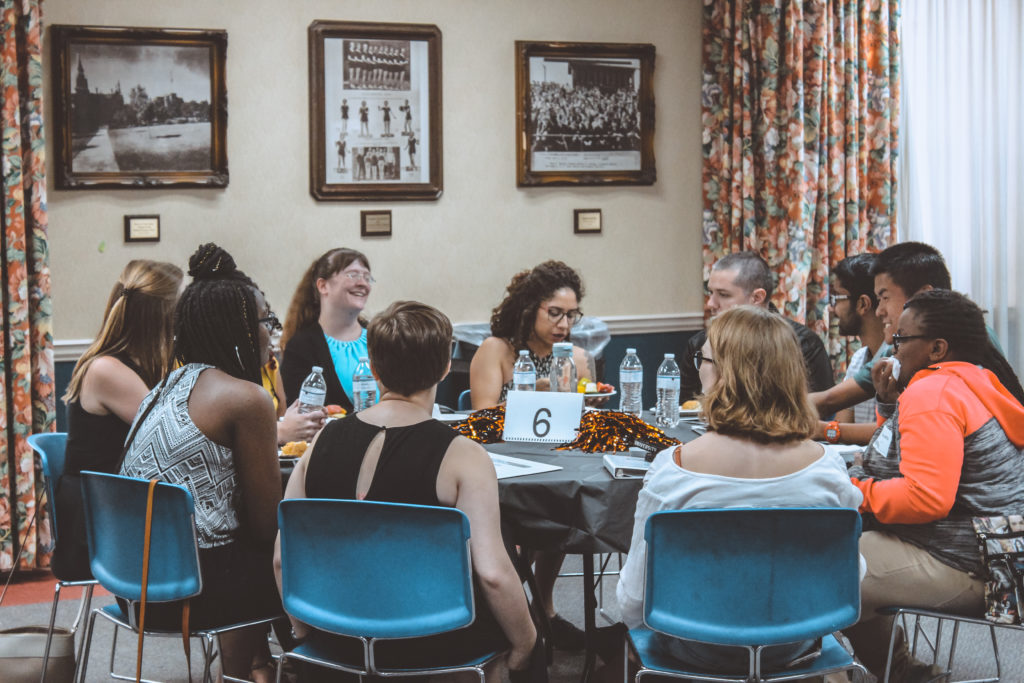
As a first-generation college student, Twiggs County native Aylah Birks came to Mercer worried that her high school knowledge wouldn’t be enough and nervous about finding a community. But with support from the Mercer Firsts Program, her fears were eased and her confidence boosted. And now, she’s guiding other first-generation students as a peer mentor for the program.
Since 2017, Mercer Firsts has been helping new Bears have a successful first year. Students who have been admitted to the University and have indicated they are the first generation in their family to go to college are invited to join the program. Each year, 20-40 students participate, and there are 22 in this year’s group, said Elsie Dru Miles, assistant director of student success.
Each student is matched with a faculty or staff mentor as well as a peer mentor. First-generation students may have unique issues they’re dealing with, and their mentors are there to help them and also celebrate their accomplishments. During the semester, students meet at least once a month with their faculty or staff mentor.
“It’s really all about connection,” Miles said. “It is about community and allowing students who are first-generation students to come into college and feel confident throughout the year because they have a mentor who is a faculty/staff member here and has the inside scoop on how things work here.”
Many of the faculty and staff mentors have participated for multiple years, and some were the first generation of their family to go to college, like Dr. David Davis, professor of English and director of fellowships and scholarships, and Melissa Matthias, associate director of awarding and compliance in the Office of Student Financial Planning. Both have served as mentors for four years.
Matthias recalled how hard it was to be in a new place as a college student, away from her family. As a Mercer Firsts mentor, she tries to make herself available to her mentees 24/7 and communicates with them almost on a daily basis, sending them good morning texts and checking in to see how their week is going. She also meets with them in person at times in her office or for coffee, lunch or dinner.
“I try to relate to them my experience of what I went through,” she said. “I let them know they can do this. They just become like my babies. I just love it. I love it when they come in green, when they come in with their eyes wide open, just ready to tackle the world.”
The mentee-mentor relationship is informal, and depending on their personalities, some students want to meet more often than others, Dr. Davis said. He likes to get away from the academic office setting and catch up with his mentees at locations like Z Beans, the Connell Student Center or the University Center.

The Mercer Firsts Program helps new students “learn the hidden curriculum of college life,” Dr. Davis said. “Most of these students have left home and their families for the first time in their lives. All of this environment is new and different. This mentorship program is a way to help these students acclimate, but often they don’t know what they need to acclimate. It’s part of the mentor’s job to help them figure out what they need.”
Dr. Davis said he stays in touch with his mentees after their first year, and it’s been gratifying to see those students win awards and graduate. Similarly, Matthias said she continues to check in on her mentees, and she lets them know that she can be a friend for life. She strives to be that person who eases their minds and reminds them that they can move past the hard times and still conquer the world.
Birks said her faculty mentor, senior biology lecturer Dr. Shonteria Johnson, showed her how to take charge, be accountable, effectively communicate, improve study habits and handle constructive criticism. Dr. Johnson became a role model and like family to her.
“She became my older sister that I never had because I could always go and talk to her about my problems,” Birks said. “The different lessons and conversations I was able to have, I feel it created another community that I found as a safe space.”
The first-year students in the Mercer Firsts Program also have the support of peer mentors who, like Birks, who have already been through the program. This year, there are eight peer mentors, all sophomores and juniors.
“They have a student mentorship going on, which is really nice for the participants to have that relatability with someone closer to their age and going through it as we speak,” Miles said. “They have casual check-ins with them throughout the year.”
Birks, a junior neuroscience major, is a peer mentor to three first-year students now. She wanted to be able to encourage first-generation students as they began their college journeys, offer advice and lend an ear. She connects with them at Mercer Firsts events as well as through regular correspondence through text messaging and the GroupMe platform.

“I’ve always just wanted to be able to serve and be able to help,” she said. “It’s something when you can find your groove, but it’s amazing when you can take someone under your wing and help them find their groove.
“I want to make sure they have a community that they can always come to … that they have more good days than bad days throughout the semester.”
The first-year students also attend two or three workshops each semester that focus on campus resources and how to be successful, as well as end-of-semester and end-of-year celebrations and service-related events. The goal is to give them all the pertinent information upfront, so they will already have that knowledge when they need it, Miles said.
“Going to college, I didn’t know what I didn’t know,” said Miles, who relates to program participants as a first-generation student herself. “My parents and I, we didn’t know the questions to ask. I didn’t know who to go to, so we had to figure it out and ended up making mistakes along the way. You make mistakes if you don’t know what you’re doing sometimes.”
Looking back, Dr. Davis wishes he had a professional mentor relationship like the Mercer Firsts Program provides.
“I can remember being that student trying to figure out the college environment,” he said. “Most of what I figured out along the way was either through other students or through trial and error, which means making mistakes that had to be fixed. Having someone to turn to to ask questions … that goes a long way.”
The mentorships, connections and community help the students to be successful and show them they are not alone in their experiences. Miles said Mercer Firsts participants have been shown to achieve higher GPAs than first-generation students not in the program.
“This program definitely is very beneficial,” Matthias said. “A student has so much stuff coming at them that sometimes it’s good to have somebody you can talk to to break away from that.”








